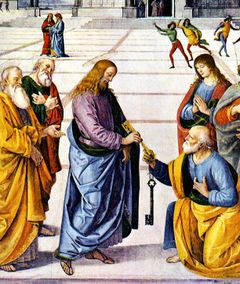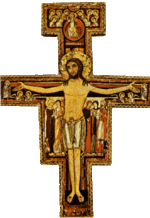Pope Innocent III
| Innocent III | |
|---|---|
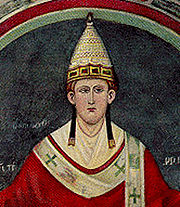 |
|
| Papacy began | 8 January 1198 |
| Papacy ended | 16 July 1216 |
| Predecessor | Celestine III |
| Successor | Honorius III |
| Personal details | |
| Birth name | Lotario de' Conti di Segni |
| Born | 1160 or 1161 Gavignano, Papal States, Holy Roman Empire |
| Died | 16 July 1216 (aged 54–55) Perugia, Papal States, Holy Roman Empire |
| Other Popes named Innocent | |
| Papal styles of Pope Innocent III |
|
|---|---|
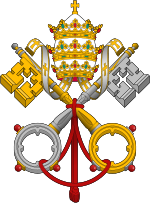 |
|
| Reference style | His Holiness |
| Spoken style | Your Holiness |
| Religious style | Holy Father |
| Posthumous style | None |
Pope Innocent III (1160 or 1161 – 16 July 1216) was Pope from 8 January 1198 until his death. His birth name was Lotario dei Conti di Segni, sometimes anglicised to Lothar of Segni.
Contents |
Biography
Early life and election to the Papacy
Lotario de' Conti was born in Gavignano, near Anagni.[1] His father was Count Trasimund of Segni and was a member of a famous house, Conti, which produced nine Popes, including Pope Gregory IX (1227–1241), Pope Alexander IV (1254–1261) and Pope Innocent XIII (1721–1724). Although Lotario is commonly identified as the nephew of Pope Clement III (1187–1191), that error arises from the similarity between Clement's family name, Scolari, with that of Scotti, the noble Roman family of Lotario's mother, Clarice.[2]
Lotario studied in Rome, where he received his early education, Paris, where he studied theology, and Bologna, where he studied jurisprudence. In any case, as Pope, Lotario was to play a major role in the shaping of canon law. He became one of the greatest jurists of his time.[1]
Shortly after the death of Alexander III (30 August 1181) Lotario returned to Rome and held various ecclesiastical offices during the short reigns of Lucius III, Urban III, Gregory VIII, and Clement III, reaching the rank of Cardinal-Deacon in 1190. He subscribed the papal bulls between 7 December 1190 and 4 November 1197.
As a cardinal, Lotario wrote On the Misery of the Human Condition.[3] The work was very popular for centuries, surviving in about 500 manuscripts. He never returned to the complementary work he intended to write, On the Dignity of Human Nature.[4]
Celestine III died on January 8, 1198. Before his death he had urged the College of Cardinals to elect Giovanni di San Paolo as his successor; but Lotario de' Conti was elected pope, at Rome, on the very day on which Celestine III died. He accepted the tiara with reluctance and took the name of Innocent III. He was only thirty-seven years old at the time.[1]
Reassertion of Papal power
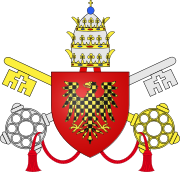
As pope, Innocent III began with a very wide sense of his responsibility and of his authority. The Muslim recapture of Jerusalem in 1187 was to him a divine judgment on the moral lapses of Christian princes. He was also determined to protect what he called "the liberty of the Church" from inroads by secular princes. This determination meant, among other things, that princes should not be involved in the selection of bishops, and it was focused especially on the "patrimonium" of the papacy, the section of central Italy claimed by the popes and later called the Papal State. The patrimonium was routinely threatened by Hohenstaufen German kings who, as Roman emperors, claimed it for themselves. The emperor Henry VI expected to be succeeded by his infant son Frederick as king of Sicily, king of the Germans, and Roman Emperor, a combination that would have brought Germany, Italy, and Sicily under a single ruler and left the patrimonium exceedingly vulnerable.[1]
The early death of Henry VI left his 4 year old son, Frederick II the king. Henry VI’s widow, Frederick's mother, Constance of Sicily, ruled over Sicily for her young son before he reached the age of majority. She was as eager to remove German power from the kingdom of Sicily as was Innocent III. Before her death in 1198, she named Innocent as guardian of the young Frederick until he reached his majority. In exchange, Innocent was also able to recover papal rights in Sicily that had been surrendered decades earlier to William I of Sicily by Pope Adrian IV (1154–59). The Pope invested the young Frederick II as King of Sicily in November 1198. He also later induced Frederick II to marry the widow of King Emeric of Hungary in 1209.[1]
Involvement in Imperial elections
Papal power was based on more than scriptures. The popes acquired large amounts of land and bishops and clergy were, in theory, agents of papal programs. Pope Innocent III’s increased involvement in Imperial elections took historically documented form when he called the Fourth Lateran Council in 1215 during which time he beckoned around 1200 bishops, abbots and nobles from around Europe to assist in either tweaking current laws or creating new ones to further influence the masses in supporting the Pope as the universal authority of the empire.
In order to define fundamental doctrines, the council reviewed the nature of the Eucharist, the ordered annual confession of sins, and prescribed detailed procedures for the election of bishops. The council also mandated a strict lifestyle for clergy, banning their participation in judicial procedures involving extremely painful punishments by which the accused would either atone for their sins or prove themselves innocent of often frivolous charges. One doctrine that confirmed the “power over the spirit” theory was the implementation by the council mandating that Jews wear special identifying markings on their clothing – a sign of the increased hostility felt by Christians towards Jews in the region.[5]
Another tool Innocent III used to attempt to gain universal authority and have more involvement in Imperial elections was letters he wrote to power brokers in the region. While the content of the letters was subtle in their inferred goal of securing his authority, when read in total, his goal becomes more obvious:
Papal Authority: Letter to the prefect Acerbius and the nobles of Tuscany, 1198,
Just as the founder of the universe established two great lights in the firmament of heaven, the greater light to rule the day and the lesser light to rule the night, so too He set two great dignities in the firmament of the universal church..., the greater on to rule the day, that is, souls, and the lesser to rule the night, that is, bodies. These dignities are the papal authority and the royal power. Now just as the moon derives its light from the sun and is indeed lower than it in quantity and quality, in position and in power, so too the royal power derives the splendor of its dignity from the pontifical authority.....[6]
Other letters that Innocent III sent during this attempt to mandate and secure the papal proprietor as the universal authority by demeaning and attempting to minimize the authority of the emperors were written under the title “Papal Policies”:
- "On Heresy: Letter to the Archbishop of Auch, 1198
- "On Usury: Letter to the French bishops, 1198
- "On Church Independence/Tithes: Letter to a bishop, 1198
- "On the crusade and Trade with Saracens: Letter to the Venetians, 1198
- "On Jews: Decree of 1199”[7]
One of the most direct public notices of the universal authority of the pope came in Innocent III’s “Papal Decree on the choice of a German King, 1201". It was his opportunity to force the acceptance of his decree amidst a chaotic election of three men for emperor:
It is the business of the pope to look after the interests of the Roman empire, since the empire derives its origin and its final authority from the papacy; its origin, because it was originally transferred from Greece by and for the sake of the papacy...its final authority, because the emperor is raised to his position by the pope who blesses him, crowns him and invests him with the empire....Therefore, since three persons have lately been elected king by different parties, namely the youth [Frederick, son of Henry VI], Philip [of Hohenstaufen, brother of Henry VI], and Otto [of Brunswick, of the Welf family], so also three things must be taken into account in regard to each one, namely: the legality, the suitability and the expediency of his election......Far be it from us that we should defer to man rather than to God, or that we should fear the countenance of the powerful....On the foregoing grounds, then, we decide that the youth should not at present be given the empire; we utterly reject Philip for his manifest unfitness and we order his usurpation to be resisted by all....since Otto is not only himself devoted to the church, but comes from devout ancestors on both sides.....therefore we decree that he ought to be accepted and supported as king, and ought to be given the crown of empire, after the rights of the Roman church have been secured.[8]
Feudal power over Europe
During the reign of Pope Innocent III, the papacy was at the height of its powers. He was considered to be the most powerful person in Europe at the time.[9] His papacy asserted the absolute spiritual authority of his office, while still respecting the temporal authority of Kings.
Philip II became Innocent III's ally in the struggle over Otto IV. Innocent stated that he had no intention of encroaching upon the rights of the princes, but insisted upon the rights of the Church in this matter. He emphasized especially that the conferring of the imperial crown belonged to the pope alone. In 1201 the pope openly espoused the side of Otto IV. On 3 July 1201, the papal legate, Cardinal-Bishop Guido of Palestrina, announced to the people, in the cathedral of Cologne, that Otto IV had been approved by the pope as Roman king and threatened with excommunication all those who refused to acknowledge him. Innocent III made clear to the German princes by the Decree "Venerabilem" which he addressed to the Duke of Zähringen in May 1202, in what relation he considered the empire to stand to the papacy. This decree, which has become famous, was afterwards embodied in the "Corpus Juris Canonici".[10]
Here are some highlighted points from the decree: The German princes have the right to elect the king, who is afterwards to become emperor.
-This right was given them by the Apostolic See when it transferred the imperial dignity from the Greeks to the Germans in the person of Charlemagne.
-The right to investigate and decide whether a king thus elected is worthy of the imperial dignity belongs to the pope, whose office it is to anoint, consecrate, and crown him; otherwise it might happen that the pope would be obliged to anoint, consecrate, and Crown a king who was excommunicated, a heretic, or a pagan.
-If the pope finds that the king who has been elected by the princes is unworthy of the imperial dignity, the princes must elect a new king or, if they refuse, the pope will confer the imperial dignity upon another king; for the Church stands in need of a patron and defender.
-In case of a double election the pope must exhort the princes to come to an agreement. If after a due interval they have not reached an agreement they must ask the pope to arbitrate, failing which, he must of his own accord and by virtue of his office decide in favour of one of the claimants. The pope's decision need not be based on the greater or less legality of either election, but on the qualifications of the claimants.[1]
Otto allied himself with England (he was the nephew of King John) to fight Philip II Augustus, but he was defeated in the Battle of Bouvines in what is now Belgium, on July 27, 1214. Thereafter Otto IV lost all influence and died on May 19, 1218, leaving Frederick II the undisputed emperor. King John was forced to acknowledge the Pope as his feudal lord and accept Stephan Langton as Archbishop of Canterbury.[11]
Innocent III played further roles in the politics of France, Sweden, Bulgaria, Spain, and especially England.[11]
Innocent called the Fourth Crusade, which was diverted to Constantinople. The pope excommunicated the Crusaders who attacked Christian cities, but he made no move to halt or overturn their actions because he felt, erroneously, that the Latin presence would bring about a reconciliation between the Eastern and Western Churches. Innocent also ordered a crusade against the Albigenses, which successfully subdued the Cathar heresy in France but at a great cost in life and blood.[12]
Crusades and suppression of heresy
Innocent III was a vigorous opponent of heresy, and undertook campaigns against it.
At the beginning of his pontificate, he focused on the Albigenses, also known as the Cathars, a sect that had become widespread in the area that is now southernwestern France, but which at that time was under the control of local princes, such as the Counts of Toulouse. The Cathars rejected the authority and the teachings of the Catholic church, as well as its corruption. In 1199, Innocent III condemned unauthorized translations of the Bible into French. Two Cistercian monks were sent to dispute the teachings of the Cathars and to reassert Papal authority. The 1208 murder of Peter of Castelnau, a papal representative in Albigensian territory, changed Innocent's focus from words to weapons. Innocent called upon Louis IX of France to suppress the Albigenses. Under the leadership of Simon of Montfort a campaign was launched. The Albigensian Crusade, which led to the brutal slaughter of thousands of men, women and children, Cathar and Catholic alike, essentially destroyed the previously flourishing civilization of Occitania and brought the region firmly under the control of the King of France. The Albigensian Crusade was the only crusade declared by the Catholic Church against fellow Christians.
Innocent also decreed the Fourth Crusade of 1198, intended to recapture the Holy Land. The pope directed his call towards the knights and nobles of Europe rather than to the kings; he did not deliberately try to exclude kings, but Henry of Germany had just died, and Richard I of England (1189–99) and Philip II of France were not anxious to resume the cross after just being at war. Innocent III's call was generally ignored until November 1199, when a crusade was finally organized in Champagne. The Crusaders were redirected to capture Zara (Zadar) in 1202 to pay the Venetians for ships and transport of the army over the sea. Constantinople would be captured for prince Alexius IV in 1204 in exchange for men, money, weapons and more ships. Innocent III was horrified by the attack on the Byzantines. By attacking Zara they had automatically been excommunicated according to Innocent's threats. Prior to the launching of the Crusade he had insisted that no Christian cities be attacked.[13]
On November 15, 1215 Innocent opened the convocation of the Fourth Lateran Council, considered the most important council of the Middle Ages. By its conclusion it issued seventy reformatory decrees. Among other things, it encouraged creating schools and holding clergy to a higher standard than the laity. It also forbade clergymen to participate in the practice of the judicial ordeal, effectively banning its use. At the Fourth Lateran Council, Innocent III and his prelates legislated against subordination of Christians to Jews. Canon 69 forbade "that Jews be given preferment in public office since this offers them the pretext to vent their wrath against the Christians."[14]
Death and legacy
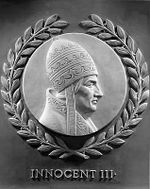
The Council had set the beginning of the Fifth Crusade for 1217, under the direct leadership of the Church. After the Council, in the spring of 1216, Innocent moved to northern Italy in an attempt to reconcile the mariner cities of Pisa and Genoa, though removing the excommunication cast over Pisa by his predecessor Celestine III and a pact with Genoa, to imbue them of more religious and commercial motivations.[15]
Innocent III, however, died suddenly at Perugia[1] on July 16, 1216. He was buried in the cathedral of Perugia, where his body remained until Pope Leo XIII had it transferred to the Lateran in December 1891.
Innocent III was believed to be in purgatory as the same day he died, he appeared to St. Lutgarda in her monastery at Aywieres, in Brabant. Engulfed in flames, he declared to her, “I am Pope Innocent”. He continued to explain that he was in purgatory for three faults which had caused him to arrive in this state. Innocent asked St. Lutgarda to come to his assistance saying, “Alas! It is terrible; and will last for centuries if you do not come to my assistance. In the name of Mary, who has obtained for me the favor of appealing to you, help me!” At that moment he disappeared and St. Lutgarda informed her sisters of what she had seen. [16]
Works
His Latin works include De Miseria Humanae Conditionis, a tract on asceticism that Innocent III wrote before becoming pope, and De Sacro Altaris Mysterio, a description and exegesis of the liturgy.
Notes
- ↑ 1.0 1.1 1.2 1.3 1.4 1.5 1.6 "Catholic Encyclopedia: Pope Innocent Iii". Newadvent.org. 1910-10-01. http://www.newadvent.org/cathen/08013a.htm. Retrieved 2010-02-17.
- ↑ Michele Maccarrone, "Innocenzo III prima del pontificato," Archivo della R. Deputatazione romana di Storia patria, 66 (1943):59–134 at 66. Werner Maleczek, Papst und Kardinalskolleg von 1191 bis 1216, Vienna 1984, p. 101–104, do not mention this relationship at all.
- ↑ [1]
- ↑ The Cambridge history of Renaissance ... - Google Books. Books.google.com. http://books.google.com/books?id=jJnyxg3xxTEC&pg=PA306&lpg=PA306&dq=on+the+dignity+of+human+nature+pope+innocent+iii&source=bl&ots=51MboaoZMe&sig=HT_RkH169wDun87RZhDog8k2Rv0&hl=en&ei=PnuXScWXJse_tgekhKCgCw&sa=X&oi=book_result&resnum=4&ct=result. Retrieved 2010-02-17.
- ↑ Civilization in the West,” Kishlansky, Geary, O’Brien, Volume A to 1500, Seventh Edition, page 277
- ↑ Sourcebook: Innocent III.
- ↑ “A Source Book for Medieval History,” New York, 1905
- ↑ http://www.fordham.edu/halsall/source/innIII.html
- ↑ “Civilization in the West,” Kishlansky, Geary, O’Brien, Volume A to 1500, Seventh Edition, pg. 278
- ↑ "Home". New Advent. http://www.newadvent.org. Retrieved 2010-02-17.
- ↑ 11.0 11.1 Powell, James M. Innocent III: Vicar of Christ or Lord of the World? Washington: Catholic University of American Press, 2nd ed., 1994. ISBN 0813207835
- ↑ http://historymedren.about.com/library/who/blwwinnocent3.htm, http://www.newworldencyclopedia.org/entry/Pope_Innocent_III
- ↑ "The Crusades". Crusades.boisestate.edu. http://crusades.boisestate.edu. Retrieved 2010-02-17.
- ↑ "Medieval Sourcebook: Twelfth Ecumenical Council: Lateran IV 1215". Fordham.edu. http://www.fordham.edu/halsall/basis/lateran4.html. Retrieved 2010-02-17.
- ↑ "School of Theology". Sthweb.bu.edu. 2009-09-02. http://sthweb.bu.edu/archives. Retrieved 2010-02-17.
- ↑ Schouppe, Fr. F.X., Purgatory. TAN, 2005
References
- Innocenzo III: Urbs et Orbis. 2 vols. Atti del Congresso Internazionale, Roma, 9–15 settembre 1998, ed. Andrea Sommerlechner. Rome, 2003.
- Moore, John C. Pope Innocent III (1160/61 – 1215): To Root Up and to Plant. Brill, 2003; Pbk U. of Notre Dame P., 2009.
- Sayers, Jane. Innocent III: Leader of Europe, 1198–121. Longman, 1994.
- Werner Maleczek, Papst und Kardinalskolleg von 1191 bis 1216, Wien 1984
- Lavergne, Félix Jr. (1993). The Glory of Christendom. Christendom Press.
- Rendina, Claudio (1983). I papi — Storia e segreti. Rome: Newton Compton.
- Barraclough, Geoffrey (1968). The Medieval Papacy. London: Thames and Hudson.
- Moore, John C. "Pope Innocent III, Sardinia, and the Papal State." Speculum, Vol. 62, No. 1. (Jan., 1987), pp 81–101.
- The Catholic Encyclopedia, Volume VIII. Published 1910. New York: Robert Appleton Company.
- Papal Monarchy. August 27, 2007. Union County College . October 12, 2007."Papal Monarchy". Faculty.ucc.edu. http://faculty.ucc.edu/egh-damerow/papal_monarchy.htm. Retrieved 2010-02-17.
- “A Source Book for Medieval History,” New York, 1905.
- “Civilization in the West,” Kishlansky, Geary, O’Brien, Volume A to 1500, Seventh Edition
- Powell, James M. Innocent III: Vicar of Christ or Lord of the World? Washington: Catholic University of American Press, 2nd ed., 1994. ISBN 0813207835
- Schouppe, Fr. F.X., Purgatory. TAN, 2005
External links
- Find-A-Grave
- Innocent III at the Catholic Encyclopedia
- Adrian Fletcher’s Paradoxplace - Portrait (Subiaco) and Tomb (Lateran) of Innocent III
- Innocent III's Opera Omnia
- NNDB
- Cambridge History of Renassiance Philosophy
- Sourcebook: Innocent III Medieval Sourcebook: Innocent III
- Medieval Sourebook
- New World Encyclopedia
- History Medren
- Ecole Glossary
- Crusades
- Lateran Council
- Theology
- Pope Innocent III and the Marks of a Great Papacy, article at Catholicism.org
| Catholic Church titles | ||
|---|---|---|
| Preceded by Celestine III |
Pope 1198–1216 |
Succeeded by Honorius III |
|
|||||||||||||||||||||||||||||||||||||||||||||
|
|||||||||||||||||||||||||||||||||||||||||
